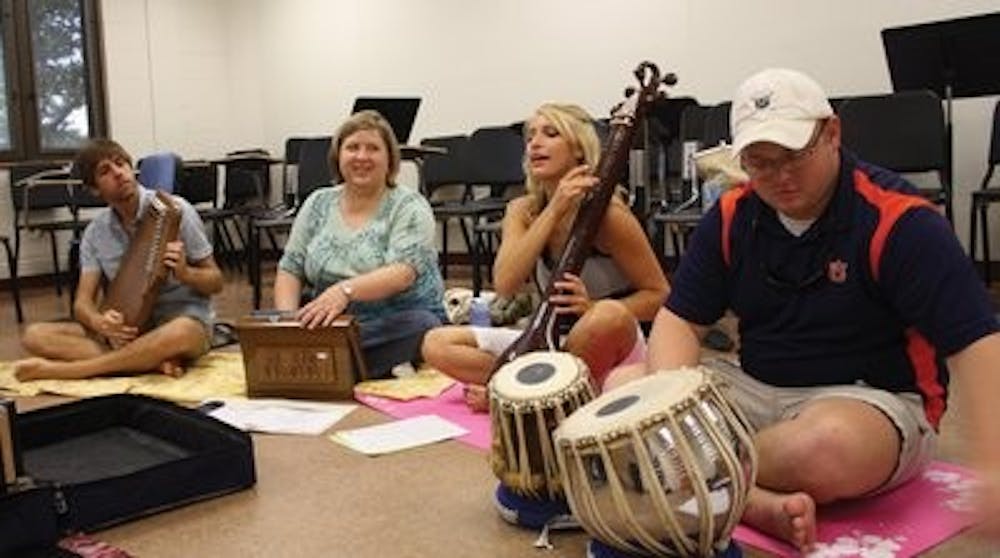Being a part of India can be as easy as walking into Room 229 in Goodwin Hall on a Monday night.
In Shiladitya Chaudhury's Indian ensemble class, the point is to immerse yourself in another culture by learning to perform classical Indian music.
Forget desks and tests. This class is for the experience. Students sit in a circle on colorful mats and joke about having the unfamiliar instruments upside down.
But, once the music begins, it feels like you could be walking the streets of India.
The Indian ensemble class, which began last fall, will also be offered in the upcoming fall and spring semesters. There are no requirements for the class or any major restrictions, and it counts as a liberal arts/music elective.
Students in the class play instruments including harmoniums, tapturas, tablas, surpetis and an assortment of other authentic Indian instruments. Western instruments, like violins and flutes, can also be incorporated.
Don't be afraid to be vocal along with the music. The only instrument that you need in the class is your voice, Chaudhury said.
"(The class) is primarily vocal, mainly because the Indian instruments are kind of difficult to master," Chaudhury said. "What I tell people is everyone comes with one free instrument from birth, and that's your voice."
The melodies are easy going and relaxing, enough so that students say they use this class as a time to free their mind of the pressures of more challenging classes.
The Indian culture also plays an important role in the class.
"We try to make it authentic as possible," Chaudhury said. "We sit on the ground Indian-style, and when we perform at the end of the semester, we typically get authentic (Indian) outfits for everybody."
Chaudhury said some students might come in and realize it's not for them, but said he encourages people to come and try it.
"I think that people who stick with it a few weeks eventually grow to like it," Chaudhury said.
It is possible that there will be a 2-3 week study abroad course this time next year.
"It would be learning about Indian music, but doing it in India," Chaudhury said.
While there, students would be introduced to Indian musicians and instrument makers.
Although the class may seem difficult to some, Chaudhury said participation is the main key to success his classroom.
"In Indian music, there are two fundamental pillars that it's built on," Chaudhury said. "One is called Raga, which is melodic aspect of music. The other is Taal, or Tala, which is the rhythmic aspect. Each one of these has a whole theory kind of behind them and the way they interact which makes music."
The goal of the class is not to come out knowing how to play or sing the music like an expert, but to gain an appreciation and understanding for this form of art.
"My main goal in the class is that students should go away with a little bit of kind of theoretical understanding of how Indian music is put together from Ragas and Taals," Chaudhury said.
This is a class where students are taught to play music, but they do not have to be familiar with reading staff notation, so anyone can enroll in it.
"We actually use an Indian notation system translated in English, so everyone can understand," Chaudhury said.
At the end of every semester, the students' final exam is to perform a public recital.
This class has also given students the opportunity to get involved with the Indian Cultural Society in Birmingham and to participate in Indian cultural functions.
"I think that people come in sometimes, and they don't know what to expect because -- especially in Alabama -- there is not a lot of Indian culture music that is available to people," Chaudhury said.
This semester's students seem to be enjoying the once-in-a-lifetime aspect of the class.
"I originally played piano and guitar growing up," said Shalyn Creel, senior in pre-pharmacy. "But I never played instruments like this before, so it's really unique and special to be able to play a different culture's instrument."
Students from India are also in the class, offering a unique experience for those far from home.
Shantanu Pradham, Ph.D. student in chemical engineering, said he has been interested in Indian classical music since his childhood and took this opportunity to learn about it.
The students are not the only ones getting pleasure out of taking this music class.
"I think I get the most pleasure actually listening to my students, and because when they get it \0xAD--for any teacher -- that's just the most amazing part of it," Chaudhury said.
Do you like this story? The Plainsman doesn't accept money from tuition or student fees, and we don't charge a subscription fee. But you can donate to support The Plainsman.





